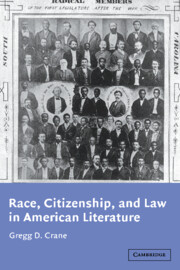Book contents
- Frontmatter
- Contents
- Acknowledgments
- Introduction
- Chapter 1 Higher law in the 1850s
- Chapter 2 The look of higher law: Harriet Beecher Stowe's antislavery fiction
- Chapter 3 Cosmopolitan constitutionalism: Emerson and Douglass
- Chapter 4 The positivist alternative
- Chapter 5 Charles Chesnutt and Moorfield Storey: citizenship and the flux of contract
- Notes
- Index
Chapter 5 - Charles Chesnutt and Moorfield Storey: citizenship and the flux of contract
Published online by Cambridge University Press: 22 September 2009
- Frontmatter
- Contents
- Acknowledgments
- Introduction
- Chapter 1 Higher law in the 1850s
- Chapter 2 The look of higher law: Harriet Beecher Stowe's antislavery fiction
- Chapter 3 Cosmopolitan constitutionalism: Emerson and Douglass
- Chapter 4 The positivist alternative
- Chapter 5 Charles Chesnutt and Moorfield Storey: citizenship and the flux of contract
- Notes
- Index
Summary
Given the avalanche of positivist precedent, legal and literary, covered in the previous chapter, one may well wonder that the higher law argument survived the crush, but it did. Indeed, the post-Reconstruction era's increasing positivism seems to have intensified the efforts of a wide variety of reformers and intellectuals to articulate an ethical basis for American society and law. Higher law reasoning persisted in the woman's rights movement, populist and progressive politics, anti-imperialism, trade unionism, and advocacy for full black citizenship. Drawing on traditional conceptions of American citizenship as embodying, to borrow James Ketner's words, “the ideal of volitional allegiance,” these late nineteenth-century reformers often portrayed contract as the mode and sign of just human relations. Booker T. Washington, for example, made the mechanism of commercial contract central to his program for racial uplift. If equipped to compete, Washington urged, black Americans would be able to find security and freedom transcending race in economic partnership with white America. For feminists, such as Elizabeth Cady Stanton, Susan B. Anthony, and Victoria Woodhull, the symbol of free and equal contract illuminated the way marriage was mired in anti-consensual notions of gender status and role. Stanton and others felt that making marriage more genuinely contractual would strike a blow for all women.
But these reformers were hardly alone in using the language of contract.
- Type
- Chapter
- Information
- Race, Citizenship, and Law in American Literature , pp. 183 - 222Publisher: Cambridge University PressPrint publication year: 2002

